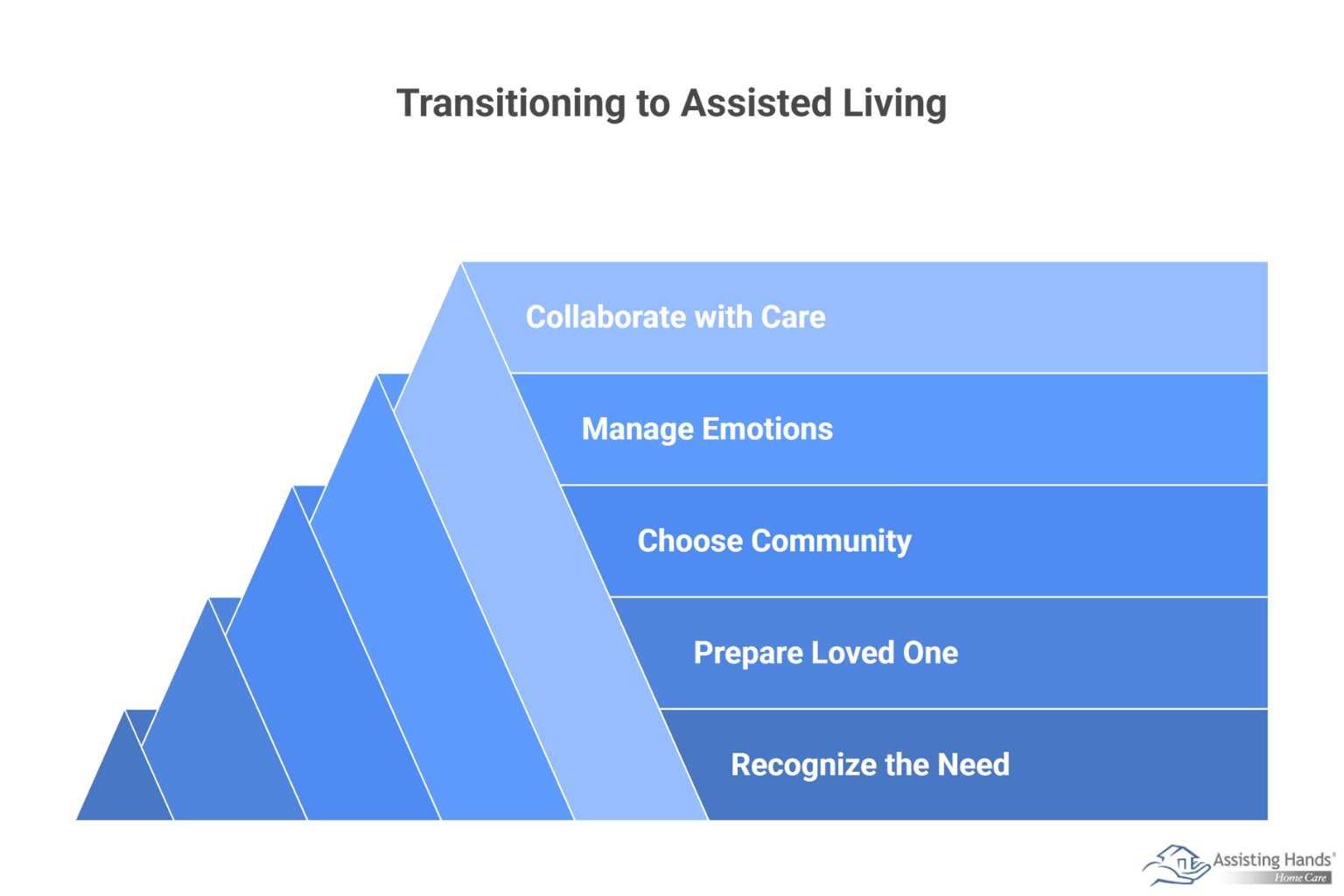
Table of Content
Making the decision to transition a senior loved one with dementia to assisted living represents one of the most challenging choices families face. This significant change requires careful planning, emotional preparation, and understanding of how dementia affects the adjustment process.
Understanding When It’s Time to Make the Move
Recognizing the right time for assisted living becomes crucial for both safety and quality of life. Several key indicators suggest when home care may no longer provide adequate support for someone with dementia.
Safety concerns often serve as the primary catalyst for this decision. Watch for signs such as:
- Wandering behavior that puts your loved one at risk
- Forgetting to turn off appliances or leaving doors unlocked
- Medication errors or missed doses
- Falls or accidents becoming more frequent
- Getting lost in familiar places
Caregiver burnout represents another critical factor. Family caregivers may experience physical exhaustion, emotional stress, or health problems from providing around-the-clock care. When caregiver wellbeing is impacted significantly, professional care becomes necessary for everyone’s safety and health.
Progressive care needs increase as dementia advances. Advanced stages may require specialized medical attention, structured activities, and 24-hour supervision that exceeds what family caregivers can reasonably provide.
For many seniors with dementia, professional in-home care can be a wonderful alternative to assisted living. Caring for senior loved ones can be challenging for families who don’t have expertise or professional training in home care, but this challenge doesn’t have to be faced alone. Family caregivers can turn to Assisting Hands Home Care for the help they need. We provide high-quality in-home care as well as comprehensive Alzheimer’s, dementia, stroke, and Parkinson’s care.

Preparing Your Loved One for the Transition
The preparation phase requires patience and sensitivity, as people with dementia may have difficulty understanding or accepting the upcoming change. Early-stage dementia patients might participate in discussions, while those in later stages need different approaches.
Communication strategies should remain simple and reassuring. Avoid overwhelming details about why the move is necessary. Instead, focus on positive aspects like new friends, activities, and continued family visits. Present information gradually over several conversations rather than all at once.
Timing considerations matter significantly for reducing confusion and anxiety. Choose a time when your loved one typically feels most alert and calm. Avoid making the announcement during stressful periods or when your loved one is experiencing increased confusion.
Involving your loved one in decisions helps him or her maintain dignity and control. Let your loved one choose which personal items to bring, what pictures to display, or which clothes to pack. These small decisions can provide comfort during an otherwise overwhelming transition.
Choosing the Right Memory Care Community
Not all assisted living facilities provide appropriate care for dementia patients. Memory care communities offer specialized services designed specifically for cognitive impairment challenges.
Specialized programs should include structured daily activities, cognitive stimulation exercises, and behavioral management strategies. Look for communities with staff trained specifically in dementia care, including techniques for managing agitation, confusion, and communication difficulties.
Physical environment features matter significantly for dementia patients. Secure facilities prevent wandering while maintaining a homelike atmosphere. Well-designed spaces include:
- Clear sight lines and simple layouts to reduce confusion
- Secure outdoor areas for safe walking and fresh air
- Familiar design elements that promote comfort
- Adequate lighting to prevent falls and disorientation
Staff-to-resident ratios should support individualized attention and care. Higher staffing levels enable better monitoring, personalized activities, and more responsive care when behavioral challenges arise.
Many seniors prefer aging in place over moving to assisted living facilities. If your senior loved one needs assistance to remain safe and comfortable while living at home, reach out to Assisting Hands Home Care, a leading Reston senior care agency. Our dedicated in-home caregivers can assist with meal prep, bathing and grooming, exercise, medication reminders, and many other important tasks.
Managing the Emotional Impact
The transition affects everyone involved, including the person with dementia, family members, and even existing caregivers. Acknowledging and addressing these emotional challenges can help you create a smoother adjustment period.
Addressing guilt and grief among family members requires understanding these feelings are normal and expected. Many families experience guilt about “giving up” on home care, even when professional care clearly benefits their loved ones. Counseling or support groups can provide valuable emotional support during this difficult time.
Supporting your loved one’s adjustment may take weeks or months. Expect some resistance, confusion, or sadness initially. Maintain consistent visiting schedules, bring familiar items from home, and work with staff to understand your loved one’s preferences and routines.
Maintaining family connections remains important even after the move. Regular visits, phone calls, and participation in facility activities preserve relationships and provide comfort. Work with staff to understand the best times to visit when your loved one is most alert and receptive.
Working with Professional Care Teams
Successful transitions require collaboration between families and professional caregivers. Memory care communities typically employ interdisciplinary teams including nurses, social workers, activity coordinators, and specialized dementia care staff.
Care plan development should incorporate detailed information about your loved one’s history, preferences, routines, and behavioral triggers. Share information about what calms your loved one, his or her favorite foods, meaningful activities, and effective communication strategies.
Ongoing communication with care staff ensures continuity and allows for adjustments as needs change. Regular care conferences provide opportunities to discuss progress, concerns, and modifications to care approaches. Don’t hesitate to ask questions or voice concerns about any aspect of care.
A highly trained in-home caregiver with experience in caring for seniors with dementia can be a fantastic resource for family members. For trusted and reliable dementia care, Reston families can turn to Assisting Hands Home Care. We are experts in caring for seniors with memory-related conditions, our caregivers are available 24/7, and all of our dementia care programs are backed with a 100% satisfaction guarantee. To learn about our quality-assured services, give us a call today.







